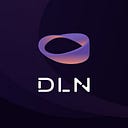FAQ
Overview
What is DLN?
DLN is an advanced non-custodial exchange that enables fast, highly capital-efficient, and secure native trading across chains.
How does DLN work?
With DLN, all transfers are performed through a self-organized peer-to-peer liquidity network, instead of through liquidity pools, with cross-chain intercommunication between smart contracts powered by the deBridge generic messaging infrastructure.
What are the major advantages of using DLN over bridges or other cross-chain platforms?
DLN solves many of the most critical challenges facing cross-chain platforms, including:
- Lower cost: Users can make trades for as low as 8bps, as there are no fees to pay to AMMs, and no loss of additional capital to MEV/slippage.
- Deeper liquidity: DLN can draw liquidity from the entire market efficiently, instead of being limited by the amount of liquidity locked in a pool on the destination chain (as per a classical bridge).
- Protection from slippage & MEV: Users always receive the exact amount they see on the DLN interface, whereas with other platforms users never know the exact amount they will receive from the liquidity pool on the destination chain, with their only recourse being to modify the “slippage tolerance” parameter.
- No reverted transactions: Users will never experience a reverted transaction on DLN. This can happen on classical bridges if other transfers are processed before your transaction achieves finality, resulting in slippage exceeding the specified tolerance parameter.
- Shorter time to finality: The unique design of DLN means that transactions are settled in seconds or minutes, avoiding the scenario where users must wait for dozens of minutes (e.g. 256 blocks or 13min for transfers from Polygon) before their transfer is settled on the destination chain.
- Native assets: With DLN all transfers happen natively, and there is no possibility of any user ending up on the hook with bad liquidity, or bearing additional slippage and risk of MEV to settle transfers via wrapped assets.
Trading
What assets and chains does DLN support for trading?
Any assets can be traded between Ethereum, Arbitrum, Polygon, BNB Chain, and Avalanche. DLN will support additional chains (EVM and non-EVM) soon.
How can I create a market order or limit order?
On DLN, orders are at market price by default. To trade across chains at the current market price, just select the token/chain you want to trade to.
If you want to trade across chains with a limit order, you can simply edit the buy price or total.
What are the advantages of a market order vs. a limit order?
A market order will be executed as quickly as possible.
A limit order allows you to modify the price where your trade gets executed, but it may take longer.
What are the fees?
Each trade on DLN incurs a minimum fee of 8bps. 4bps goes to the DLN protocol, and 4bps goes to the taker that fulfils your order.
The fee paid to the taker may be higher than 4bps if you place a limit order, however.
Security
Is DLN secure?
DLN is fully non-custodial and has been designed and thoroughly tested to provide strong security guarantees. However, as with all DeFi protocols, usage is at your own risk. Please read DLN’s Terms and Conditions for more information.
Has DLN been audited?
DLN and deBridge, which powers all cross-chain messaging on DLN, have passed multiple independent audits:
https://github.com/debridge-finance/debridge-security
